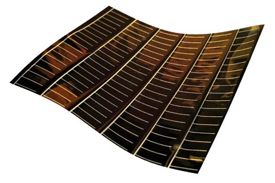
Thin Film Terrestrial Photovoltaic Modules, including amorphous silicon (a-Si), copper indium gallium selenide (CIGS), and cadmium telluride (CdTe) technologies, represent an innovative approach to solar energy capture. These modules are characterized by their thin, flexible, and lightweight design, which sets them apart from traditional crystalline silicon panels. Thin film photovoltaics are well-suited for various applications, from building-integrated solar systems to portable and flexible solar panels. Among the technologies, a-Si offers a cost-effective and amorphous structure, making it highly versatile for different surfaces, while CIGS and CdTe modules provide impressive energy efficiency and durability.
They can be manufactured using less material and in a more environmentally friendly manner compared to their crystalline counterparts. Thin film solar panels have made significant strides in terms of performance and are being increasingly adopted in urban environments and off-grid applications. Their flexibility and adaptability open up creative possibilities for solar integration in unconventional spaces and the development of solar-powered technologies, contributing to the expansion of renewable energy usage in a rapidly evolving energy landscape.
IS 16077:2013/IEC 61646:2008, IS/IEC 61730 (Part 1):2004, and IS/IEC 61730 (Part 2):2004 are essential standards for manufacturers of thin film terrestrial photovoltaic modules, including a-Si (amorphous silicon), CIGS (copper indium gallium selenide), and CdTe (cadmium telluride) modules. These standards establish the requirements for designing, constructing, and testing thin-film photovoltaic modules. Compliance with these standards is often a prerequisite for certification and regulatory approval, allowing manufacturers to sell their products in various markets.
Note: Manufacturers of thin film terrestrial photovoltaic modules, including a-Si (amorphous silicon), CIGS (copper indium gallium selenide), and CdTe (cadmium telluride) modules, are required to obtain the mandatory BIS/CRS Registration to launch their products in the Indian market.
BIS/CRS Registration has been established to ensure that photovoltaic modules used in harnessing solar energy in terrestrial applications adhere to stringent quality and safety standards as stipulated by the BIS. It plays a crucial role in enhancing consumer protection, ensuring the availability of reliable solar energy products in the Indian market, and addressing concerns related to electrical safety, performance, and reliability. This mandatory registration contributes to the availability of high-quality solar modules in India and supports the growth of the solar energy industry by maintaining the safety and reliability of these products.
Bureau of Indian Standards is a statutory body in India responsible for the formulation and implementation of standards to ensure the quality and safety of various products. Under the BIS framework, there exists a scheme called CRS (Compulsory Registration Scheme), which mandates that certain categories of products must undergo mandatory registration and comply with specified quality and safety standards before they can be sold in the Indian market. This scheme was established in 2012 and has since played a crucial role in enhancing product quality and safety in India by ensuring that items such as electronics, appliances and automotive components meet the necessary standards before they reach consumers. BIS/CRS Registration is vital for market access, as it is a legal requirement for selling the product in India. Failure to obtain this registration can result in confiscation of goods and legal consequences. Therefore, manufacturers and importers need to be diligent in ensuring their products meet the necessary criteria.
The list of documents required for BIS/CRS registration is as follows:
For more detailed information, please click here.
Follow the given steps to complete your BIS/CRS registration process:
Step 1: Register on the BIS portal and obtain your login credentials
Step 2: Choose a test lab and generate a test request
Step 3: Submit the sample(s) to the lab
For more detailed information, please click here.
Brand Liaison provides valuable support in obtaining the BIS/CRS Registration for thin film terrestrial photovoltaic modules, including a-Si (amorphous silicon), CIGS (copper indium gallium selenide), and CdTe (cadmium telluride) modules. Our services include:
For a more in-depth understanding of the documentation and procedures involved in obtaining BIS/CRS Registration, feel free to connect with our team of experts at +91-9250056788 or +91-8130856678.